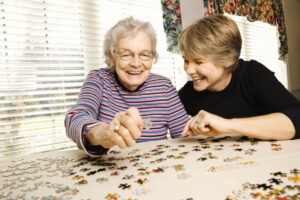Here are a few things to think about as you help a loved one adapt to life after moving to an assisted living community.
Even when you know that you made the right call by helping your loved one move to a senior living community, the transition is bound to take some time. After all, they’re adapting to a new environment, daily routine and group of people. Here are a few tips for helping ease the transition.
Encourage Involvement (But Don’t Be Pushy)
It seems intuitive to encourage your loved one to get involved, but try to find balance between being encouraging and pushing them to do something in which they’re genuinely disinterested.
“The reason we have a variety of activities is to meet the variety of interests of residents,” says Emily Sanderson, Life Enrichment Director at Mercy Retirement & Care Center, an Oakland assisted living community. “So going through the calendar together and highlighting events that he/she really wants to attend can be helpful.”
It’s usually easier to do something new with someone you know, so try to plan visits during the activities that piqued your loved one’s interest. They’re more likely to try it again once they know what to expect.
Make the New Place Feel Like Home
A comfortable and familiar living space is key to settling in, so encourage your loved one to bring cherished items and help them personalize their new home.
Present them with straightforward decorating choices (“The blue curtains or the yellow?” sounds simpler than “Do you want to put up some curtains?”), and make the room as personal as possible (Try “This is a great picture, how about we put it on your nightstand?”).
Keep in Touch
Call and visit often during the first week to let your loved one know you’re there for them, while also giving them space to settle into a routine. There is no right number of times to visit—trust your instincts and what you know about your loved one.
Encourage your siblings, children, friends and relatives to arrange visits of their own. Make phone calls to talk about recent events in your life, recommend a new book or movie, or just to say “Good morning.” If they’re computer-savvy, arrange Skype conversations or email videos of family gatherings and the kids’ performances or games.
Ask Questions
Several residents that Sanderson works with recall the comfort of knowing their children were attending to their finances as they were undergoing the transition to Mercy. Others appreciated the help their children provided with moving furniture and taking care of shopping. When you’re unsure how to be helpful, just ask, and be aware that their needs may change.
Adjusting to Assisted Living Takes Time
Sanderson explains that the most well-adjusted residents prioritize making friends in the community. Even if your loved one is hesitant to get involved with organized activities, urge them to get to know their neighbors.
Well-adjusted resident try to make the most of their new community, says Sanderson. “They are accepting of the fact that they need assistance, but are also aware that they’re a part of a community that they have so much to contribute to.”




















